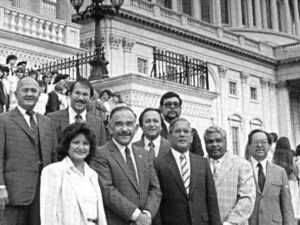Guam Commonwealth Act

The speedy negotiations and innovative agreement between the Northern Marianas and the US shocked many Guåhan residents.
The voters of Guåhan had rejected reunification with the Northern Marianas in 1969, fearing the financial burden of developing the neighbor islands and because the Northern Marianas CHamorus, who had been under Japan’s pre-World War II rule, had assisted the Japanese military in their wartime occupation of the island. The Northern Marianas had been territories of Japan after World War I. The CHamorus of Guåhan had remained loyal to “Uncle Sam” during those agonizing years of World War II, many suffering starvation, torture, forced labor and death at the hands of the Japanese. Most also lost their homes and businesses in the American bombardment and recapture of the island.
The loyalty of Guåhan’s CHamoru community, however, was not rewarded. In fact, over the next few years the Guam Commonwealth Act was submitted continually to the US Congress during the tenures of Congressman Vicente “Ben” Blaz (1985-1992) and Congressman Robert Underwood (1993-2002) but languished during the administrations of President George H.W. Bush and President Bill Clinton. The Commonwealth Act remained at a standstill in 1997. The major objections, again, had to do with CHamoru self-determination, immigration, and labor control.